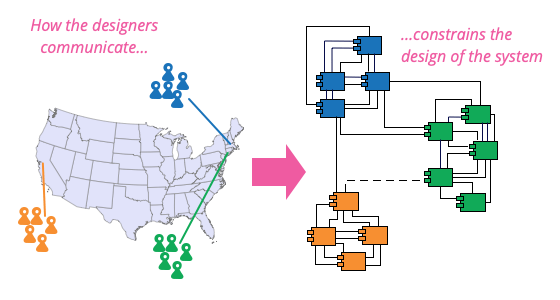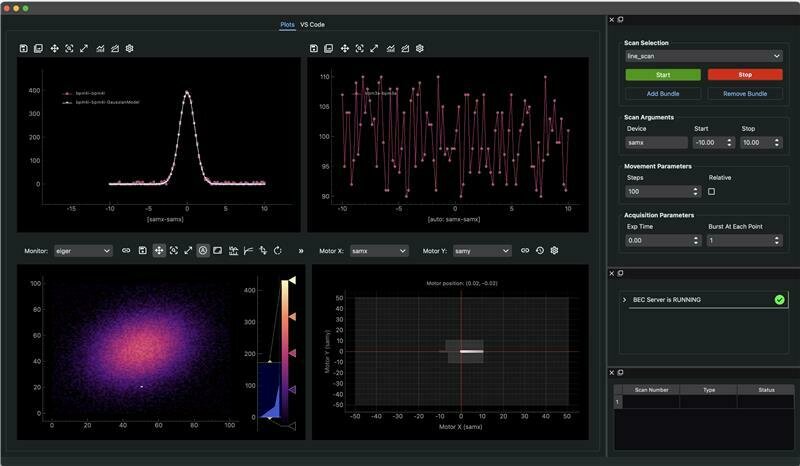20th of November, 2024


presentation by Matias Guijarro, AWI dept

From to :
Control System Comparison and Perspectives
SLS 2.0 Beamline Scientist Expert Group
About the speaker
Software Engineer
20-year career at ESRF,
Beamline Control Unit
BLISS project responsible: 2017-2023


In sabbatical leave since 01/24
Joined BEC Development Team at Science IT Infrastructure and Services Department, PSI





Breaking news

January, 2025: will start at


Talk outline
Control System comparison
- Architecture
- Technical choices
- Configuration
- Scans
- Graphical Interfaces
- Data Saving
- Data Management
- Data Processing
Perspectives
- Symbiosis
- Introducing Blissdata
- Proposal
Control systems comparison
Conway's law

From "How Do Committees Invent?" (1968)
Organizations which design systems [...] are constrained to produce designs which are copies of the communication structures of these organizations.
Melvin Conway, circa 1968 and more recently.


Architecture comparison


VS.


Architecture


scalar
Main components running within the same process (think of SPEC)
Hardware control is also part of it, mostly as direct connection or through

Architecture

Device Server
Scan Server
Scan Bundler Service
Scihub Service
BEC shell
BEC core library




Main components running as services (multiple processes)
Hardware control is delegated to Ophyd (Bluesky project), mostly through

Written in Python


I/O based on gevent, cooperative multi-tasking
Technical choices

Built-in direct hardware control, or


Centralized architecture
ptpython shell



Written in Python

Services-oriented architecture

Multi-threading

Devices control via Ophyd (Bluesky)

Buffer and settings DB

Buffer and message broker

IPython shell

Qt graphical interfaces


Qt and web graphical interfaces
{..}
{..}
Human-readable, editable YAML configuration
Human-readable, editable YAML configuration


HDF5 file saving format
HDF5 file saving format
Scan API comparison


framework

library
Scan stubs
Scan class to write, with methods:
open, stage, pre_scan, core loop, complete, unstage, close
Maximum flexibility
Acquisition chain (tree)
Node devices trigger acquisition
Leaf node devices take data
Channels push data to Redis
Core loop is always the same
configuration
code
Graphical User Interfaces

"one size fits all" online visualization
Has to be used with BLISS shell:
Region of Interest selection, basic user interaction
No scan launching, no device tweaking (motors...), no parameter forms
Flint





Daiquiri
Custom applications
Developed by engineers, adapted for the beamline technique/experiments
General concepts: device tweaking, scans launching, queuing, forms, logging, etc


ESRF GUI strategy towards
web apps
Graphical User Interfaces


ptpython
interpreter
blissterm server
ptpython
interpreter

API

blissterm application
socket io

xtermjs

Daiquiri UI components library
logic



blissdata
Blissterm : enhanced web shell

BEC Graphical User Interfaces

Complete set of widgets and helpers to build advanced applications

BEC Widgets

BEC Designer, to quickly build applications with BEC widgets

Enable developers or power users to make their own UI with reusable components, connected to the control system

General purpose applications, i.e
beamline alignment
BEC Graphical User Interfaces
BEC dock areas brings better User Experience, allowing users to organize widgets as they want

Data saving comparison
Both systems have Writers as external processes, taking data and metadata from acquisition and writing Nexus compliant files

ESRF Nexus flavour is supposed to be compatible with the European consensus (ALBA, DESY, MAX IV, SOLEIL...)

BLISS does not implement Application Definitions yet
The file structure is unified at whole facility level - conversion to other formats can happen if absolutely necessary
BEC file structure can be adapted thanks to plugins


Data saving: note about HDF5 limitations
- While writing in SWMR mode, HDF5 groups/datasets/attributes/links cannot be created
- Only POSIX file systems are supported which excludes network file systems like NFS
- SWMR is only supported from HDF5 1.10.0 onward. Matlab, IDL are often stuck on older HDF5 versions (typically 1.8.x)
- A SWMR reader needs to wait until the writer enables SWMR mode before it can open the file
Current SWMR (Single Writer Multiple Reader) mode has shortcomings
HDF5 is best to archive data - it is not well suited to read while writing
Writers should lock the files they write, readers should disable locking
- and retry read when it fails or seg faults
- silx library provides utility function for this
- h5recover can sometimes save corrupted files (worst case !)
Users can interact with the ESRF Data Portal directly from the BLISS command line

Proposal
Datasets
Metadata
- acquisition parameters
- sample parameters
Gallery
- images, plots, associated to a dataset
Tape interface
newcollection("sample1")
Data management

IH-LS-3167: elemental distributions in microalgae


BLISS commands to submit comments, plots, execution output, logs
elog_add("...")
Automatic notifications from the control system
(in case of errors, beamline events...)
Manually editable from the Data Portal
searchable
Data management

Data management

The Scilog API can be invoked to push to the Electronic Logbook
(no high-level command from shell or automatic mechanism yet)


SciCat integration can be made similar to SwissFEL, automatic archival after experiment
Data Processing

Processing data is hard and takes time !
What processing do I need to do?
Where is my data ?
What software do I need to install? And how ?
There is too much data!
I will never be able to process it all !
Oh god, I forgot to apply the mask !
The software is not working and the PhD/post-doc who wrote it left !
Data Processing
How to improve data processing experience, and how to apply processing as soon as possible?
- To make informed decisions during acquisition
- To provide users with tools to help/encourage further data analysis


i.e, to go from this...
to this:
Data Processing Workflows




Acquisition control

Execute workflow on
- local machines (immediate feed)
- slurm nodes
Tasks can be rearranged or reused in other workflows without deep knowledge of the task content

Upload result to data portal
Persist result for further analysis

Visualization, feedback



Workflows are data processing pipelines composed of several steps (tasks)
EWOKS project : Esrf WOrKflowS
EWOKS workflow example


Raw parameter space

Workflow based on xraylarch
Parameter space in which scientific decisions are made

EXAFS visualization
Data processing



Live fitting of data using LMFIT
Plugins for BEC DAP can be written to do some more advanced processing
Perspectives
Symbiosis


In which areas both BEC and BLISS could benefit each other ?
Where is it worth collaborating ? "Return on investment"
What would be beneficial for the control system users ?

relies on blissdata to publish acquisition data to Redis
Introducing Blissdata


blissdata is a separate package with limited dependencies, easy to integrate in any Python project

Blissdata publishes data (producer)
Blissdata can also retrieve previously published data (consumers)
Support technology:
+ extensions RedisJSON, RedisSearch


Blissdata defines a model to represent scans, and provides acquisition streams to push data
Blissdata model
For big data (mainly 2D), only references are published
Pushing and retrieving data

1. Can be shipped with the event:
0D, 1D, small 2D... are within the Redis stream
2. Data is too large, or data is stored by acquisition in its own file:
JSON events are emitted, need a Blissdata plugin to reference (and de-reference) data
- ideally from Redis : circumvent the HDF5 problems, no file I/O
- the corresponding Blissdata plugin determines the action to do
- h5py-like API, transparent access to data
Retrieving data
2 cases when pushing data
Start of a collaboration around Blissdata

ESRF relies on Blissdata to get access to data from acquisition for all its sub-systems:
archiving, display, processing...
There are on-going initiatives at ALBA and DESY to bring Blissdata to their existing control system
- interoperability with ESRF tools

Even some attempts converting Bluesky documents to Blissdata model
Proposal
Device Server
Scan Server


blissdata


PyMca:
A tool designed to assist with XRF data analysis and beyond.
Publishing BEC scans with blissdata would give access to ESRF HDF5 Writer, display and processing tools


Ending remarks
Through the eyes of a visitor...


French political thinker from
"Age of Enlightenment"

Fictional letters exchanged between Persian travelers and their friends to offer a satirical and critical perspective on French society, politics, and culture, exposing its contradictions and absurdities through the eyes of outsiders.
Through the eyes of a visitor...
Absence of dedicated Product Owner for BEC
Product Owner roles:
- define product vision and alignment with business goals
- manage backlog: priorities & features
- communication with stakeholders, gathering feedback, ensuring development team understands needs
Through the eyes of a visitor...
Lack of Unified 2D detector control software:
a challenge for integration
- AreaDetector, camera server, std-daq, Jungfraujoch
- 4 APIs, inconsistencies in user experience and integration workflows
- Hard to ensure compatibility between systems
Through the eyes of a visitor...
Absence of a dedicated Integrator role:
a coordination gap
- Separation of responsibilities between BEC developers and Control engineers
- While each group performs tasks effectively, there is no dedicated role to ensure seamless integration between hardware and software components
- Task is assumed by one or the other or beamline scientist, but this can lead to misalignments, delays, and inefficiencies
Through the eyes of a visitor...
Technical responsibilities of Beamline Scientists
- Broad range of technical responsibilities are devoted to SLS Beamline Scientists, like creation of data acquisition sequences and navigating the complexity of the control system

disclaimer: gut feeling, after 20 years at ESRF

- This approach fosters expertise and autonomy, and flexibility in solutions but can also divert from primary focus on research and beamline optimization
Conclusion
Conclusion
PSI is a fantastic workplace, very stimulating environment
I am very grateful to have had the opportunity to participate to the development of BEC, and to have worked with such talented developers and committed professionals
Most features are there, but there is still a lot of work to do ; a Product Owner would be beneficial to join the team
Small development teams, existing software: let's mutualize data handling, visualization, processing, and archiving tools ! At least aim for interoperability to better serve users community